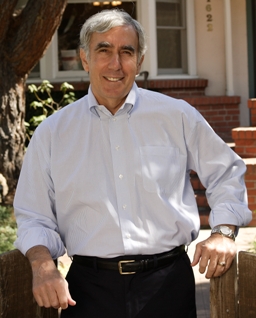“The most important thing to understand about nuclear weapons is this: these weapons do not and cannot provide physical protection to their possessors.”

These are the opening words from a written appeal by David Krieger addressed to the next president of the United States.
Last May, I chose Krieger as my ethical hero of the month due to his tireless commitment to a nuclear weapons-free world. (And you thought getting the entire U.S. government to act ethically was tough!)
David’s appeal is not only timely and thought-provoking, but provides a well-reasoned argument for the elimination of nuclear weapons in our time.
“An arsenal of thousands of nuclear weapons cannot protect the United States from a terrorist nuclear attack. The best defense against a nuclear attack is neither deterrence nor missile defenses. It is a world free of nuclear weapons, achieved by negotiations for the phased, verifiable, irreversible and transparent elimination of these weapons.”
Krieger distills his argument into a paper entitled, “A Return to Sanity – United States Leadership for a Nuclear Weapons-Free World.” The document does not rely solely on David’s own wisdom, (although he makes a good case by himself). His key points are supported by an impressive and diverse team of policymakers. Among them –
General Omar Bradley: “The only way to win an atomic war is to make certain it never starts.”
President Ronald Reagan: “A nuclear war cannot be won and must never be fought. The only value in our two nations possessing nuclear weapons is to make sure they will never be used. But then, would it not be better to do away with them entirely?”
In a January 2007 Wall Street Journal article authored by former Secretaries of State Henry Kissinger, and George Shultz, as well as former Senator Sam Nunn and former Secretary of Defense William Perry concluded:
“Deterrence continues to be a relevant consideration for many states with regard to threats from other states. But reliance on nuclear weapons for this purpose is becoming increasingly hazardous and decreasingly effective.”
So, how can this be realistically achieved?
Led by George Shultz, the group of former senior policymakers, set forth a series of specific actions.
- “Extend the key provisions of the Strategic Arms Reduction Treaty of 1991;
- “Increase the warning and decision times for the launch of all nuclear-armed ballistic missiles;
- “Discard any existing operational plans for massive attacks still remaining from Cold War days;
- “Negotiate cooperative multilateral ballistic missile defense and early warning systems; and
- “Act to prevent terrorists from obtaining nuclear weapons or the materials to make them.”
During his campaign, President-elect Obama said, “A world without nuclear weapons is profoundly in America’s interest and the world’s interest. It is our responsibility to make the commitment, and to do the hard work to make this vision a reality. That’s what I’ve done as a Senator and a candidate, and that’s what I’ll do as President.”
Obama has also said, “If we want the world to de-emphasize the role of nuclear weapons, the United States and Russia must lead by example.”
It’s time for this change to happen in our lifetime.
Comments










